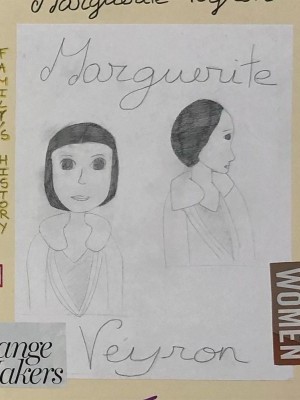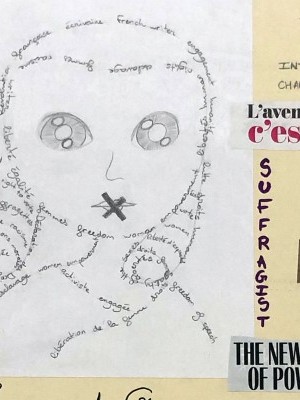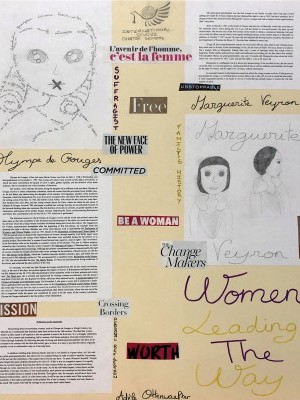Adèle Ottenwaelter
International Studies Charter High School | Miami, FL | 10th Grade
Inspirational Family Member
My Great-Great-Grandmother
My great-great-grandmother was the first woman in my family to really take a big step toward getting new rights for women. Indeed, she had obtained the right to vote in 1945, but she was making a lot of progress well before that, when young Marguerite Veyron with a chance and more opportunities didn’t wait for that.
Born on March 6, 1901, in the South of France, near the City of Marseille, she grew up and studied there. Later, during the war and to her immense sorrow, she would leave to go with her family to Aix-en-Provence. She became one of the first women of the South to obtain a commercial diploma. Her goal was to help her father run his family boat engine building business, in the Joliette District of Marseille. In addition, on October 7, 1927, at only 26 years old, she obtained her driving license, issued by the Prefect of the Department of Bouches-du-Rhône. She also obtained a Sports Cup.
At age 28, the young Marguerite married for love Émile Ollivier. After a yearlong honeymoon, they settled near La Roque, in the surroundings of Aix, for Émile’s work. He was a doctor at Cadenet. But a tragedy fell on Marguerite. Indeed, after only two years of marriage where the couple was blissfully happy, Émile contracted typhoid fever and as antibiotics did not exist yet, he died within a few months. Their daughter, Marie, my great-grandmother, was only 18 months old. Marguerite raised alone her child, which was very modern for 1931. Later, she got the right to vote at 46 years of age.
Marguerite was a suffragette but she was above all a human being. If she excelled in one, she also stood out in the other. Loving and generous, smiling and full of life, as well as stubborn and obstinate, she fought for the rights of women and the right to be a woman without restrictions.
An essential element is the historical context in which the young woman evolved. If she grew up and spread her wings in a world that left women little room to take flight, it is not so much the case today for women. If some inequalities persist, I am lucky to live in a world that has already begun to realize the role that women can play.
Historical Figure I Admire
Olympe de Gouges
Editorial note: Adèle's essay was first written in French. For the purpose of this archive, her English translation is presented first; her French original version immediately follows.
ENGLISH TRANSLATION –
Olympe de Gouges, of her real name Marie Gouze, was born on May 7, 1748, in Montauban, France, and died guillotined on November 3, 1793. This woman of Letters wrote several novels, plays, and articles, in which she advocates for people of color’s rights, gender equality, and the abolition of the death penalty. She is considered one of the founders of Feminism.
Her mother, Anne-Olympe Mouisset, is the daughter of an affluent cloth merchant and Olympe de Gouges receives a rather rudimentary education, since she comes from the provincial lower middle class. As for her father, she claims being the daughter of the Marquis of Pompignan, a member of the Académie Française. She boasts about it for, even if he never recognized her, she adores him and thinks her talent for writing comes from him. In 1765, she marries Louis Aubry, with whom she has a son two years later. Her husband dies soon after, and the young woman leaves for Paris, where she takes the pen name of Olympe de Gouges. Around 1780, she begins to publish her writings, but they are unwelcomed, because of the forward-thinking ideas she expresses, like the abolition of slavery in colonies, or gender equality in the institutions, and because of her mother tongue, Occitan. Opposing the Terror, and denouncing Robespierre and Marat, this commitment costs her her life in 1793, when she is guillotined.
The historical context in which Olympe de Gouges evolves and the social and political unrest that takes place at that time contribute to the formation and development of the desire for social development for all those whom the young woman considers left behind during the French Revolution. Her engagement for woman empowerment strengthens after the beginning of this Revolution, for example when she demands the right to divorce. Besides, one of her most famous work is undoubtedly the Declaration of the Rights of Woman and of the Female Citizen, written in 1791. Based on the Declaration of the Rights of Man and of the Citizen of 1789, this parodically-styled pamphlet aims to demand the empowerment of women, through equality in all fields, legal, social and political, because the young writer believes that these were excluded from the equality project in the aftermath of the Revolution. She writes that, “a woman is born free and stays equal to man in rights”. This ‘revolution’ within the Revolution calls on the Republic to consider women as full citizens. This text is, unsurprisingly, refused by the Convention. She also writes a sequel to Beaumarchais’ The Marriage of Figaro, in which she advocates against forced marriage.
Although her primary commitment remains unquestionably the rights of women, Olympe de Gouges also took sides in her writings for the abolition of black slavery with her play The Slavery of the Blacks, which the Comédie-Française initially refused to play. It was not shown until 1788, although it was written in 1785, and was accompanied by the manifesto Reflections on the Negros. In 1785, she also published the play The Happy Wreck, in which she denounced the living conditions of the slaves, and condemned the slave trade of the time.
To conclude, we could say that Olympe de Gouges sacrificed her life for her moral convictions, since, at the end of her days, her protests against the regime of Terror of Robespierre and Marat cost her her life. Indeed, in July 20, 1793, after the publication of her pamphlet, which is a short, polemic and violent text, The Three Urns, she is arrested and imprisoned for her counter-revolutionary writings. But she doesn’t stop there. From her cell, she displays two libels, which are short satirical pamphlets: A Persecuted Patriot and Olympe de Gouges in Revolutionary Court. On November 2, she goes to court, and is sentenced to death. She is guillotined the next day, almost ironic, since, in her Declaration of the Rights of Woman and of the Female Citizen, she states that “Woman has the right to mount the scaffold; she should likewise have the right to mount the rostrum.” She is also the second woman guillotined, after Marie-Antoinette, whom she was one of the few to support while the queen was considered by many to be the cause of the country’s problems. Olympe de Gouges dedicated the preface of her Declaration of the Rights of Woman and of the Female Citizen to Marie-Antoinette.
ORIGINAL FRENCH VERSION –
Olympe de Gouges, de son vrai nom Marie Gouze, est née le 7 mai 1748 à Montauban, et est morte guillotinée le 3 novembre 1793. Cette femme de lettres française a écrit de nombreux romans, pièces de théâtre, et articles, dans lesquels elle s’engage pour les droits des Noirs, l’égalité des sexes, et l’abolition de la peine de mort. Elle est considérée comme l’une des fondatrices du Féminisme.
Sa mère, Anne-Olympe Mouisset, étant la fille d’un drapier aisé, Olympe de Gouges reçoit une éducation assez rudimentaire, car elle vient de la petite bourgeoisie provinciale. Quant à son père, elle se dit fille du marquis de Pompignan, membre de l’Académie Française, ce dont elle se vante, car, malgré qu’il ne l’ait jamais reconnue, elle l’adore et pense tenir de lui ses talents d’écrivaine. En 1765, elle épouse Louis Aubry, qui lui donne un fils deux ans plus tard. Mais son mari meurt peu de temps après, et la jeune femme part alors à Paris, où elle prend le pseudonyme d’Olympe de Gouges. Vers 1780, elle commence à publier ses écrits, mais ils sont peu appréciés par la critique, de par les idées très avancées sur son temps qu’elle y exprime, comme l’abolition de l’esclavage dans les colonies, ou l’égalités des sexes dans les institutions, et par sa langue maternelle, l’Occitan. S’opposant à la Terreur, et dénonçant Robespierre et Marat, cet engagement lui coûte la vie en 1793, lorsqu’elle est guillotinée.
Le contexte historique dans lequel Olympe de Gouges évolue et les troubles sociaux et politiques qui ont lieu à cette époque contribuent à la formation et au développement du désir d’évolution sociale pour tous ceux que la jeune femme considère laissés pour compte lors de la Révolution française. Son engagement pour la condition féminine redouble après le début de cette Révolution, lorsqu’elle demande par exemple le droit au divorce. Par ailleurs, une de ses œuvres les plus connues est sans nul doute la Déclaration des Droits de la Femme et de la Citoyenne, écrit en 1791. Basé sur La Déclaration des Droits de l’Homme et du Citoyen de 1789, ce texte parodique vise à exiger l’émancipation féminine, par l’égalité dans tous les domaines, soit légal, social, et politique, car la jeune écrivaine pense que ces dernières ont été exclues lors de la Révolution dans son projet d’égalité. Elle y écrit que “la femme naît libre et demeure égale à l'homme en droits". Cette 'révolution' au sein même de la Révolution prône la République à considérer la femme comme citoyenne à part entière. Ce texte est, sans surprise, refusé par la Convention. Elle écrit aussi une suite au Mariage de Figaro, de Beaumarchais, dans laquelle elle milite contre le mariage forcé. Même si son engagement premier reste sans conteste le droit des femmes, Olympe de Gouges prend aussi parti dans ses écrits pour l’abolition de l’esclavage des Noirs, comme avec la pièce de théâtre L'Esclavage des Noirs, qui la Comédie-Française refuse d’abord de jouer, et qui ne sera montée qu’en 1788, bien qu’écrite en 1785, accompagnée d’un essai-manifeste, Réflexions sur les Hommes Nègres. En 1785, elle publie aussi la pièce de théâtre L'Heureux Naufrage, dans laquelle elle dénonce les conditions de vie des esclaves, et critique la politique esclavagiste de l’époque.
Pour conclure, nous pourrions dire qu’Olympe de Gouges a sacrifié sa vie pour ses convictions morales, puisque, à la fin de ses jours, ses protestations contre le régime de Terreur de Robespierre et de Marat lui coûte la vie. En effet, le 20 juillet 1793, après la diffusion de son pamphlet, qui est un texte court polémique et violent, Les Trois Urnes, elle est arrêtée et emprisonnée pour écrit contre-révolutionnaire. Mais elle ne s'arrête pas là. De sa cellule, elle fait afficher deux libelles, qui sont de courts livres satiriques : Une Patriote Persécutée et Olympe de Gouges au Tribunal Révolutionnaire. Le 2 novembre, elle passe devant le tribunal, et est condamnée à mort. Elle est guillotinée le lendemain, fait presque ironique, puisque, dans sa Déclaration des Droits de la Femme et de la Citoyenne, elle écrit que “la femme a le droit de monter à l’échafaud; elle doit avoir également celui de monter à la Tribune”. Elle est d’ailleurs la deuxième femme guillotinée, après Marie-Antoinette, qu’elle était une des rares à supporter alors que la reine était considérée par beaucoup comme la cause des problèmes du pays. Olympe de Gouges lui a dédiée la préface de sa Déclaration.
SOURCES +
What the Project Means to Me
Editorial note: Adèle's essay was first written in French. For the purpose of this archive, her English translation is presented first; her French original version immediately follows.
ENGLISH TRANSLATION –
Researching these extraordinary women, such as Olympe de Gouges or Abigail Adams, has allowed me to understand that Feminism dates back at least to the 18th century. The idea that women deserve a place equal in all respects to the one granted to men is far from new. It is a struggle, unfinished, it is true, but constant and unrelenting, led by women of all times and places, from the United States to France through Australia. By following the path of strong and determined personalities who have never accepted to be content with being given little by society, it is easy to say that this notion of gender equality is not as unthinkable today as it has long been.
In addition, building connections between history and one’s own family is of great value. Learning about my great-great-grandmother allowed me to understand the importance of two essential things in our quest to achieve equality: knowledge of the past and the realization of the impact that everyone can have. To quote Winston Churchill: “People who forget their past condemn themselves to relive it.” If this is true of a negative aspect, it is equally true of a positive one. Knowing the efforts of many women before us, some of whose blood flows through our veins, may lead us to try to do the same. As for the individual impact, it also shows us that regardless of our age, our place, or our social position, each person can contribute to this fierce battle. Even the smallest action is already a step forward. The right to vote, for example, would never have been obtained without them. And if, in a few short years, it will be my turn to make use of this exceptional possibility of the right to participate in the political life of one’s country, it is thanks and only thanks, in part, to these 100 women who had the courage to rise to make their voices heard.
ORIGINAL FRENCH VERSION –
RÉFLEXION PERSONNELLE
Faire des recherches sur ces femmes extraordinaires que sont par exemple Olympe de Gouges ou Abigail Adams m’a permis de comprendre que le féminisme remonte au moins au XVIIIe siècle. L’idée que les femmes méritent une place égale en tous points à celle accordée d’office aux hommes est loin d’être nouvelle. C’est une lutte, inachevée, il est vrai, mais constante et sans relâche qu’ont mené les femmes de tout temps et tout lieu, des États-Unis à la France en passant par l’Australie. En suivant le chemin tracé par des personnalités fortes et déterminées qui n’ont jamais acceptées de se contenter du peu que leur cédait la société, il est facile de se dire que cette notion d’égalité des sexes n’est pas aussi impensable aujourd’hui qu’elle l’a longuement été.
De plus, tisser des liens entre l’Histoire et sa propre famille a une grande valeur. Comme je l’ai fait avec mon arrière-arrière-grand-mère, cela permet deux choses essentielles à cette obtention de l’égalité : la connaissance du passé et la réalisation de l’impact que chacun peut avoir. Pour citer Winston Churchill : “Un peuple qui oublie son passé se condamne à le revivre”. Si cela est vrai d’un côté négatif, c'est tout aussi vrai d’un côté positif. Savoir les efforts fournis par de nombreuses femmes avant nous, dont certaines dont le sang coule dans nos veines, peut nous pousser à tenter de faire de même. Quant au sujet de l'impact individuel, cela nous montre aussi que quel que soit nôtre âge, nôtre lieu, ou nôtre position sociale, chaque personne peut contribuer à cette bataille acharnée. Même la plus petite action est déjà un pas en avant. Le droit de vote, par exemple, n’aurais jamais été obtenu sans elles. Et si, dans à peine quelques années, ce sera à mon tour de faire usage de cette possibilité exceptionnelle qu’est le droit de participer à la vie politique de son pays, c’est grâce et uniquement grâce à cette petite centaine de femmes qui ont eu le courage de se lever pour faire entendre leur voix.
Explore the Archive
Deadline Extended
There's still time to join Women Leading the Way.
Become a part of our storytelling archive. Enroll your class today.
Join the Project



